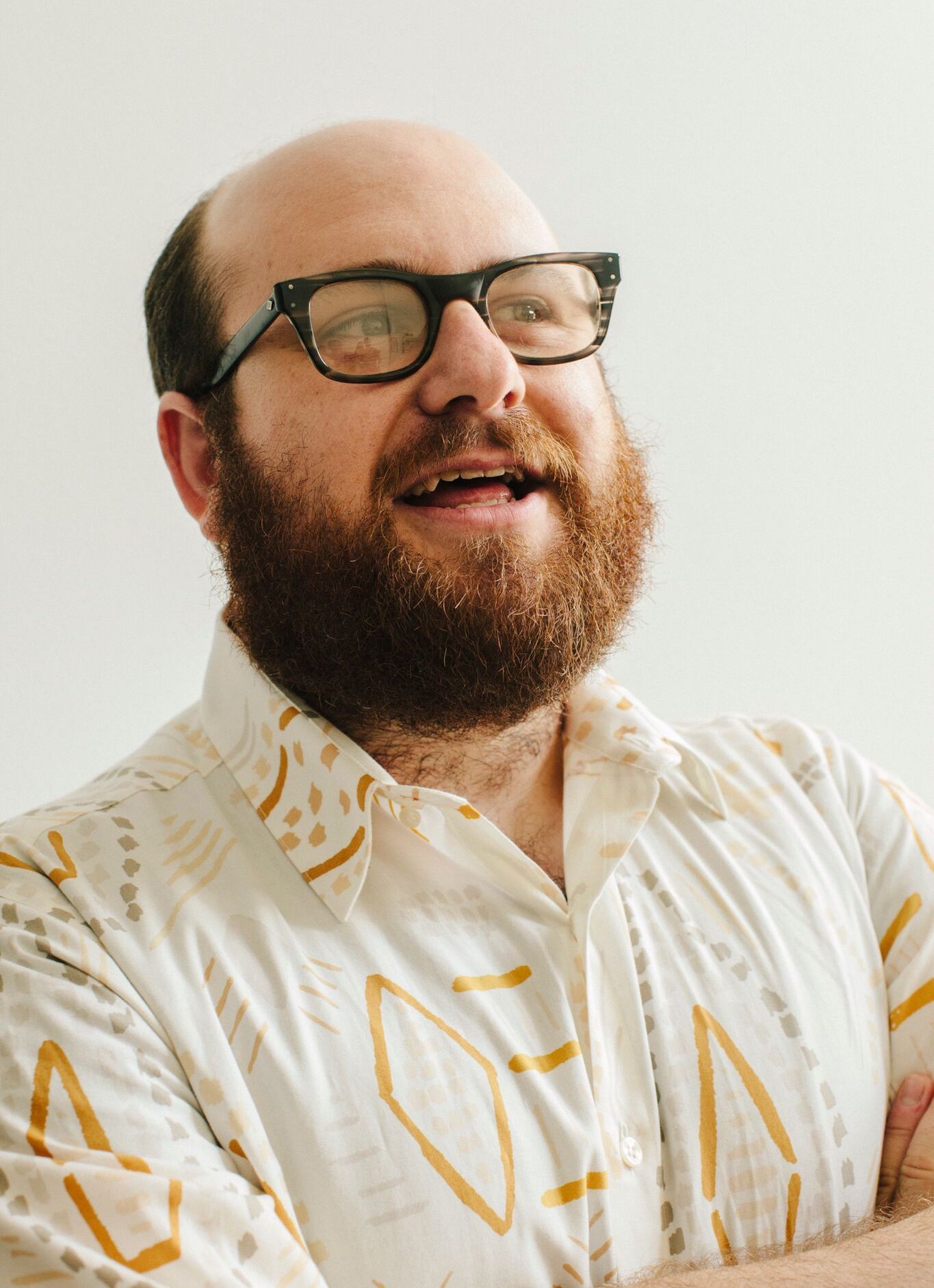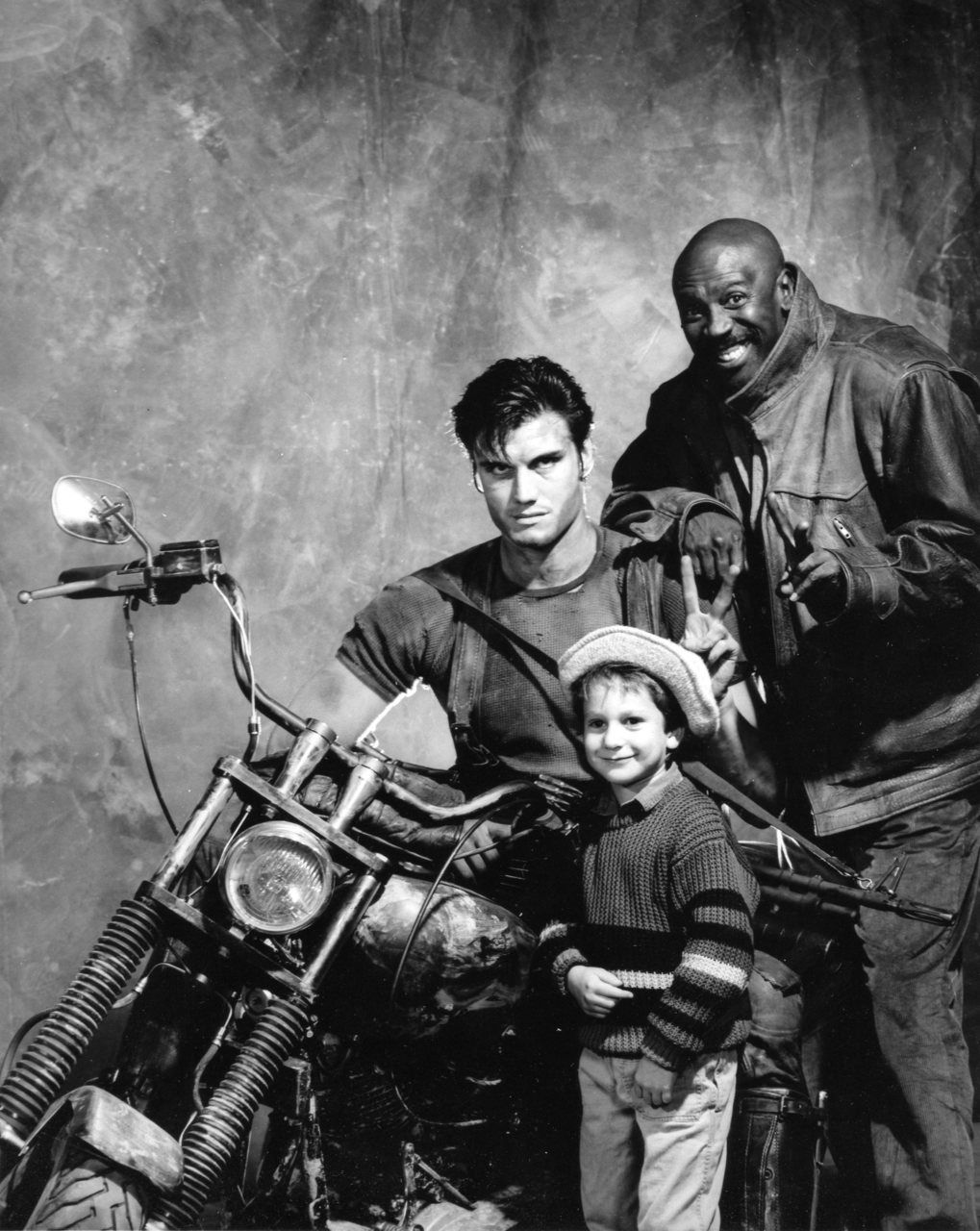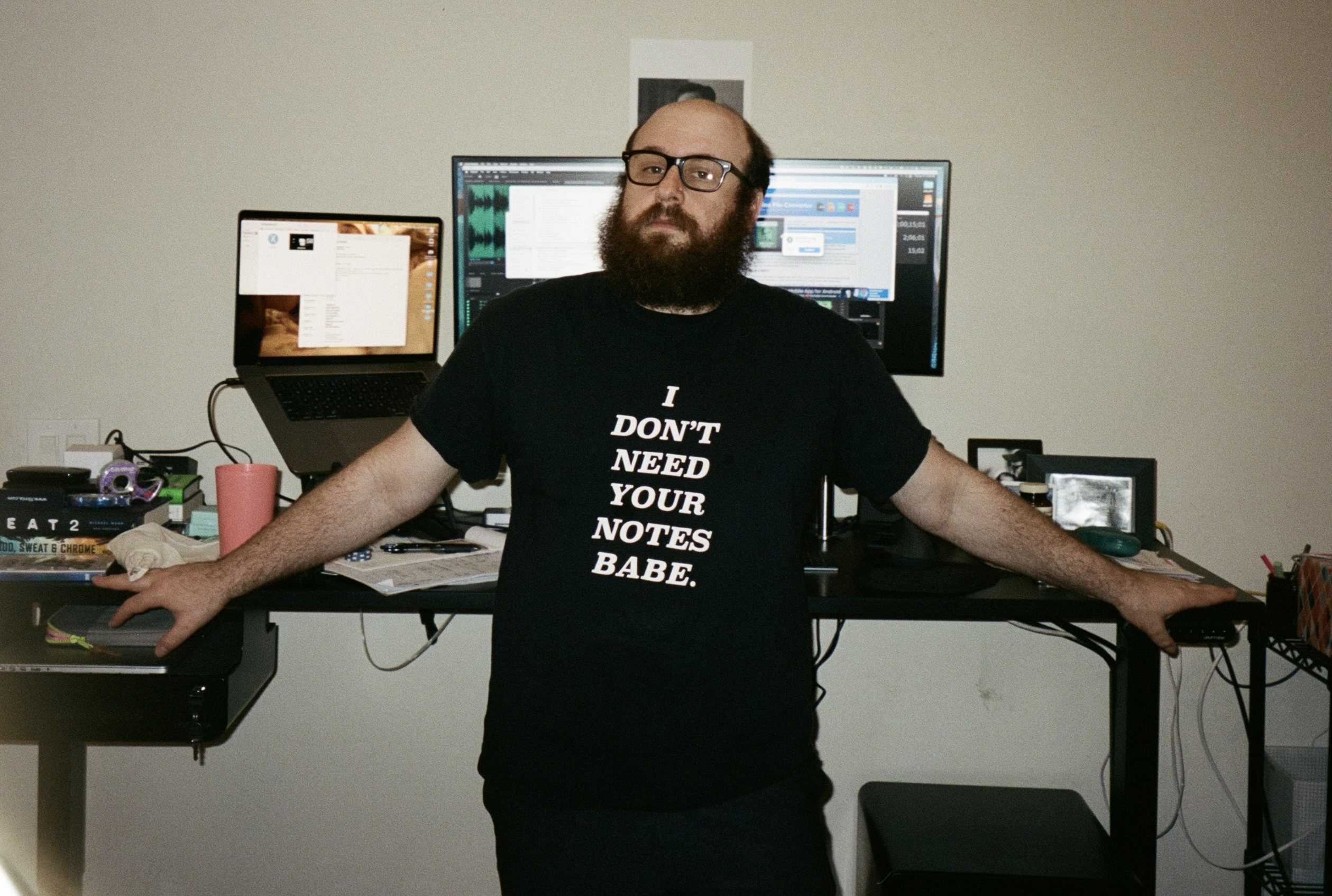
Below the Line: Editor and Actor Max Goldblatt
Max Goldblatt is an L.A.-based second generation film editor, the son of Oscar-nominated film editor Mark Goldblatt. He has cut Tribeca and Slamdance-premiering feature films, many shorts (including a Sundance-winner), and two decades worth of narrative and unscripted content for and starring the likes of Dakota Johnson, Brie Larson, Nicholas Braun, Emma Roberts, Danny Pudi, Billie Eilish, Olivia Rodrigo, Ringo Starr, St. Vincent, and MGMT. Most recently, Max edited the comedy feature, Sacramento, starring Michael Cera, Michael Angarano, Maya Erskine, and Kristen Stewart, which hits theaters worldwide in 2025.
Aminah sat down with him to talk about the director-editor relationship, crafting Kristen Stewart, and growing up with a legendary film editor father.
Aminah: Hey Max, thanks so much for being here with me today.
Max: You know, I spent some time in Sydney when my father was working on a film in the 80s, so I feel an affinity for Australia [note: Aminah is Australian].
Aminah: What was the film your dad was working on?
Max: He directed a movie called The Punisher, based on the comic book. It was one of the first Marvel movies, and it starred Dolph Lundgren and Louis Gossett Jr. My mom and I went and stayed with him. We got to visit the set, and I was enrolled in school. And we went to the Outback. It was a formative trip.

Aminah: So how's your Australian accent?
Max: No, I mean, you know, not great.
Aminah: Noiiiieeuu?
Max: Naurrrr. I remember I was very into, what’s it called? The children's book with the little—
Aminah: —Gumnut Babies. Snugglepot and Cuddlepie.
Max: Yes, yes. I think that was one of the first things I was reading.
Aminah: Me, too.
Max: Oh, wow!
Aminah: Your first foray into filmmaking was as a child actor. You’ve acted in films with some huge stars, and you have the longest character title I’ve ever read (Web Developer with No Desire for Personal Expression Up Until Freedia Beckoned Him to Dance). Where did your passion for acting come from?
Max: I grew up in a household that really celebrated the arts. I wasn't allowed to watch a lot of commercial television, but my parents showed me movies. I came to understand at a young age that, not only is this entertainment, but my dad works in this world, and this is something people do with their lives. I was always a funny kid and outgoing and that just translated into acting. There were plays in elementary school and summer camps, and it all contributed to an excitement about wanting to work in that realm. I was really passionate about it.
I eventually found an agent, and I booked my first role on an episode of TV that Drew Carey was in. It only lasted one season. I was doing a little bit of theatre in L.A., and then I was cast in the film Heavyweights, with Ben Stiller. I left school for a few months to do that. My mom uprooted to be my guardian. It was a big step.
I pursued it and did a handful of movies, but then I was going to these big cattle calls where there were tons of kids. You’re sitting in a room where everyone looks like you. At a certain point, I hit a bit of an awkward teenager phase. I was going on fewer auditions and school was becoming more important. I knew that with college coming up, I would have to decide if I really wanted to continue to pursue acting. So, I more or less stopped. The remaining acting that you see on my IMDb is mostly friends putting me in things.
Aminah: I want to circle back to your dad. He was a film editor. He got to watch Alfred Hitchcock work on one of his final films, he’s worked with Ron Howard, James Cameron, Jerry Bruckheimer, Michael Bay. He also served on the Board of Governors of the Academy of Motion Picture Arts and Sciences, and is an Academy Awards nominee for his work on Terminator 2: Judgement Day. That’s quite a legacy. What was it like growing up in that household? Were you able to watch him work and learn from him, and is that where your passion for editing was born?
Max: Yeah, definitely. When I was pretty young and summer would roll around, I would join my dad in the editing room. There are photos of me as a really young kid, sitting on his lap at the flatbed editing machine, when they were still cutting on film. As I got older, and more interested in film, I got to spend more time in the cutting room with him. Initially, they would give me little rolls of film and show me how to use the splicer and tape things together. I was making abstract random films, I was drawing on the film itself—it was just, you know, put Max in the corner. But eventually, I would get to sit and watch stuff with him.
I remember when he was about to start editing on Armageddon. He was getting VHS tapes of the dailies. He would throw them on, and we would look at them together. They were shooting three different cameras on a low-key day, and big action sequences with even more cameras. I got to sit and go through it with him and talk about, okay, there are five takes of this, and what's good or bad about each one of them, or when is the performance really working? and I got an understanding of how you construct a movie out of all these different pieces. I felt that not only was I able to be a fly on the wall, but he was curious about my ideas and took some of my suggestions. He would say I’d come in and help him, even though I was a teenager.
And I also had the point of view of someone who had acted. So I think it just made sense for me to continue on my film path. In college, for the most part, everyone is the writer/director of their own projects. I tried to make a go of it, but I was still editing. Everyone kind of recognized that I was a good editor, so I doubled down on that.
Aminah: What a great education though, being able to sit in with your dad and learn from him. Now that you’re a pro, do you ever ask him to look at cuts?
Max: Less over time, as I've kind of grown more comfortable. I think he has a respect for me that he trusts that I wouldn't show him anything until it feels really solid to me. And he may have some suggestions. I used to show him things in earlier stages, and he would have a lot to say about it. Now, I want him to see something that I'm truly proud of as opposed to something that I'm still kind of figuring out.
Aminah: You've also stepped into the role of director. I watched your short film, Becoming Fosse, which you co-wrote, directed and cut. I grew up a huge fan of Fosse’s work. My mother was a dancer back in the day, so Hollywood musicals were always playing on our TV. Your short is so funny, yet still acts as a heartwarming tribute, with star-studded cameos. How much fun did you have pulling all of that together?
Max: That was a very exciting little project done on a shoestring budget from the publishing company. It was a friend’s book and he wanted to do a book trailer but he wanted it to be memorable. Something cinematic. We pulled in a bunch of people he’d interviewed for the book, so it was fun. I feel like, had he been alive to watch it, Fosse would have enjoyed it. It was very cool to interact with Fosse's longtime editor, Alan (Heim), who was in the film and who I have also met a bit through my dad over the years. I'm a big fan of his editing, obviously, and he’s a lovely person.
Aminah: You paid homage to his editing style, for sure.
Max: Absolutely. Editing is so interesting to me because the same editor can make films that have wildly different editing styles, based on what the director wants. And so when we're pursuing something a little more flashy and a little less naturalistic or a little less invisible, I often think to myself, what would Alan Heim and Bob Fosse do? So, to be able to direct him and then edit him was very cool. He brought his Oscar that he won for All That Jazz to the shoot and to see and hold that was very cool.
Aminah: Having directed, what do you value most in a director when they’re working with you, in the role of editor?
Max: The director-editor relationship is a tricky one. I think the trust that a director needs to have in an editor comes from experience over time. I've had a few instances where you could just tell the vibe wasn't quite right. It can be due to insecurity or lack of experience—sometimes a director might micromanage an editor in a way that doesn't allow them to really express themselves and you can start to wonder why they hired you.
I like to have as much time alone with the material as possible, so that I can feel that I’ve absorbed it, come to understand it, and then put it together in a way that feels like it's honoring the director's intentions. And then we can start drilling down. It should always be a collaboration but some of the most rewarding experiences I've had with directors were when they trusted in me, trusted my instincts.
Aminah: But you like having the assembly without direction?
Max: I like to get as much info as the director wants to give me about intentions. For instance, the last feature I cut is a movie called Sylvania. We're hoping for a festival release in the coming months. The director gave me a huge scene-by-scene document of, you know, I think this take has the best material for this actor, I envisioned this scene starting with this shot, I think the first three takes of this are unusable, but see what you think. I love getting information like that so I don't come at the thing from the completely wrong perspective. But I do like to take the whole assembly on my own, so that I can propose a sense of rhythm, pacing and energy.
There's kind of an age-old thing that when you watch dailies as a director, you love it, and when you watch your assembly, you hate it, you get depressed. So, my hope is to leave a really good first impression in terms of my reaction to the material and how this could work as a movie.

Aminah: I direct and edit and I know, for me, the two inform each other tremendously. I’m always thinking about the cut when I’m filming. How does your directing experience inform your editing?
Max: What might be more interesting is how the acting informs it. A big part of an editor's job is making every department shine. It’s not talked about a lot but one of the most interesting things is how editors sculpt performance. I think the general moviegoer thinks that editors cut out the scenes that didn't need to be in the movie and put things together from what was in focus or the best camera move. But really, you’re charting emotional trajectories over the course of a story, right?
Aminah: Absolutely.
Max: An actor might come at it in a way that gives you a range of options. It’s up to you and the director to make sure the progression of emotion over the course of the scene, and film, makes sense. In a way, you’re collaborating with the actor to pull the best performance out of them, even if they never meet you. So, I find my past as an actor very helpful.
Aminah: Yes. For me, that side of it is about adding pauses to a performance, holding reaction shots longer than they were held on the day.
Max: Yeah, and often you're cheating those motivations, right? you're pulling a reaction shot from a separate part of the scene, or sometimes even from before or after they've yelled action or cut.
Aminah: For sure.
Max: Those are the victories as an editor, when you get away with something that an audience would never suspect. I love that stuff.
Aminah: It’s the best. In my last film, I did that by taking a character calling out someone's name, but I'd actually taken the audio from ten scenes earlier, and I put it in, out of shot, and it motivated the character's response so much more. And no one's the wiser.
Max: Right. On the film Sacramento, what I found fascinating about Kristen Stewart is that she is a very impulsive performer, really in the moment and really trying things. She’s giving you a lot of options to work with, and she knows this. I’d seen her performances over the years, but to be suddenly given this gift of her raw footage—how do you construct a Kristen Stewart performance? She might read a line a certain way and it's cool and it works. But then you really like the way she does a line at the end of the scene and, to get that emotional through line, the two don’t necessarily work together.
She's an incredible performer and part of that is her skill and the other part of it is the job of a good editor really honing it in a way that makes most sense for the story. I was really impressed by what she gave us. And I think there's trust there as an actor. They're trusting that the director and editor are gonna put the finished film together in a way that makes them look great.
Aminah: Across your various roles, what would you say is your happiest memory in the world of filmmaking?
Max: I’ll pick a recent one—when we premiered Sacramento at the Tribeca Film Festival. I’d had other films premiere at Tribeca, but with this one, there was a different energy. It was premiering in one of the larger theaters, and there was a red carpet. The screening was sold out, and it's a comedy. We had never shown it to more than two dozen people. So you're sitting there in the theater, the lights go down, and you're wondering if this sold-out audience is going to like this thing that you worked so hard on, or if they’re going to hate it. So, the movie starts. You’re anticipating those first couple laughs, or what you hope is a laugh. And they started rolling in. The house was on fire. They were such a great audience. There were some moments that were shocking or extremely funny, and I got so excited waiting for these moments to hit in this big auditorium.
There’s nothing like that, especially these days when you don’t know if a film is even going to play in theatres or go straight to streaming, or be lost in the shuffle. We’d just been picked up for theatrical distribution the day before. So, to be able to sit in the theater and say, not only is this so amazing, we're in a sold-out theater with people and they're loving the movie, and this is not the only time this will happen—it was just exhilarating for me.
Aminah: Awesome. So, what are you most passionate about right now?
Max: My daughter. My two-year-old. You know, working in film, so much of what I've found challenging over the last handful of years is the work-life balance. Some people really disappear into their work, and they expect you to always be available. But I'm passionate about the fact that your real life is more important than your work. If you’re not spending enough time with your family, that's a real problem, and this is spoken by someone whose father was not always in the same city as me. I do think he found the right work-life balance for himself, working with really demanding directors who expected a lot of him, but for me now, as a dad, it's important for me to really be there for my family.
What's been great is working with other directors who are at a similar station in life, who have rich lives outside of the work, and know that we can accomplish a lot in three to four hours sitting together. We don't need to be working till two o’clock in the morning. There’s a time and a place for working till 2 a.m. But it has been helpful and healthy to work with other people who trust that we can make it work, and we can also go and eat dinner with our children.
*Feature photo of Max Goldblatt by Jaclyn Campanaro

